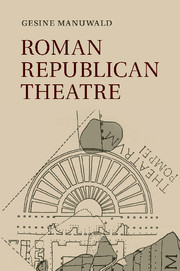Book contents
- Frontmatter
- Contents
- Preface
- Technical notes and abbreviations
- Introduction: previous scholarship and present approach
- PART I CULTURAL AND INSTITUTIONAL BACKGROUND
- PART II DRAMATIC POETRY
- 3 Dramatic genres
- 4 Dramatic poets
- 5 Dramatic themes and techniques
- Overview and conclusions: Republican drama
- Bibliography
- Index
3 - Dramatic genres
Published online by Cambridge University Press: 05 July 2011
- Frontmatter
- Contents
- Preface
- Technical notes and abbreviations
- Introduction: previous scholarship and present approach
- PART I CULTURAL AND INSTITUTIONAL BACKGROUND
- PART II DRAMATIC POETRY
- 3 Dramatic genres
- 4 Dramatic poets
- 5 Dramatic themes and techniques
- Overview and conclusions: Republican drama
- Bibliography
- Index
Summary
Dramatic festivals in classical Athens saw productions of tragedies, comedies and satyr-plays; in early Republican Italy there were numerous dramatic forms and performance traditions, with indigenous or Greek background. In such an environment the establishment of ‘literary’ drama in Republican Rome resulted in the simultaneous presence of a variety of dramatic forms. A basic distinction divides these into ‘serious drama’ and ‘light drama’, each of which comprises a number of different subtypes.
As surviving scripts and fragments show, Roman dramatic poets were fully aware of generic distinctions and characteristics of individual dramatic genres as well as of the generic expectations of audiences. That ‘dramatic theory’ was present from almost the beginning can perhaps be explained by the fact that Roman literary drama did not emerge from unreflective practice, but was started suddenly by a decision of the magistrates and the activities of a single poet, a situation that enabled or required reflections on the emerging form on the part of playwrights. Since Republican dramatists, especially Ennius and Accius, were obviously well read in classical and Hellenistic Greek literature, it is possible that they were familiar with Greek dramatic theories and that this knowledge informed their poetic consciousness and their development of drama in Latin.
- Type
- Chapter
- Information
- Roman Republican Theatre , pp. 129 - 186Publisher: Cambridge University PressPrint publication year: 2011



